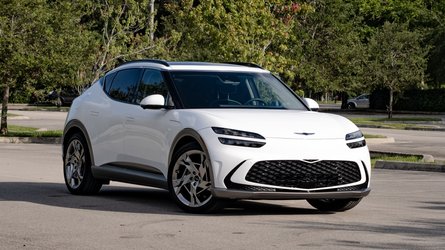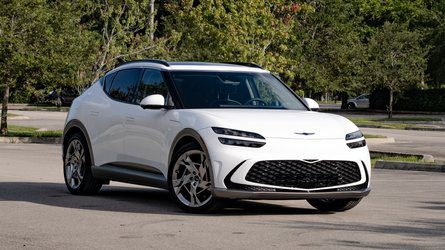The 2023 Genesis GV60 is the premium cousin of the Hyundai Ioniq 5 and Kia EV6, available in the United States since late 2022. It’s based on the same E-GMP platform as the other two models from the broader Hyundai Motor Group, but offers a more luxurious package and a bit more power in the top version. The Genesis GV60 is equipped with a 77.4-kilowatt-hour (kWh) battery pack and two all-wheel-drive powertrain options (with 234-kilowatt (kW) or 320 kW output). The version with a single motor, rear-wheel drive powertrain is not available in the US, but it’s available in South Korea and Europe.
Depending on the trim, the EPA combined range is up to 248 miles for the Advanced AWD (234 kW) 20-inch wheels and 235 miles for the Performance AWD (320 kW) 21-inch wheels. The Performance version also has a boost mode to increase the power to 360 kW for a short time of 10 seconds. However, the EPA’s documents indicate that the Performance version might have more range than 235 miles, as there is additional info “Combined range voluntarily lowered from 245 miles.” We would not be surprised then if the difference would be lower in a real-world test.
The EPA highway range ratings are probably much more usable for an average user, as the range is usually the most important on longer trips. Here, the range values are about 10 percent lower than the EPA combined range: Advanced AWD (234 kW) 20-inch wheels: 223.9 miles (360.3 km) Performance AWD (320 kW) 21-inch wheels: 213.3 miles (343.2 km). Energy consumption in the EPA combined test cycle, including charging losses, is estimated at 95 MPGe or 355 watt-hours per mile (Wh/mi). The Performance version requires roughly 5 percent more energy, according to the rating. Again, highway driving is expected to result in over 10 percent higher total energy consumption – somewhere around 400 Wh/mile (250 Wh/km).
The 2023 Genesis GV60 has an MSRP of $59,290 plus a $1,125 destination charge, which means that the effective minimum cost is $60,415. That’s some $10,000 more than the entry-level Hyundai Ioniq 5 AWD with the same battery pack type. The Performance version is noticeably more expensive at $69,415 (with the DST). The biggest hurdle for the Genesis GV60 in the US is the lack of eligibility for the $7,500 federal tax credit because the car is not produced locally, but rather it’s imported from South Korea. Another thing is the limited availability in the US, only at select Genesis retailers in 10+ states.
FAQ
Q1: Are electric car batteries recyclable?
A1: Yes, electric car batteries are recyclable.
Q2: Are electric car chargers free?
A2: It depends on the charger and the location. Some electric car chargers are free, while others may require a fee.
Q3: Can electric car batteries be rebuilt?
A3: Yes, electric car batteries can be rebuilt with the right tools and knowledge.











